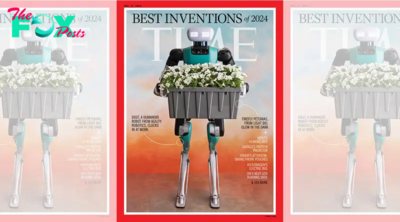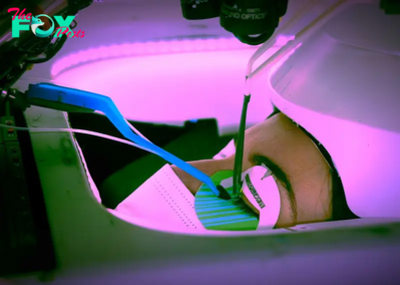Technology
‘They’re Selling You Down the River.’ Musk Slams Apple Deal with OpenAI
Elon Musk took aim at Apple after it announced a partnership to use OpenAI’s Technology on its devices. Musk took to his social media platform X (formerly Twitter) to voice concerns about Apple potentially integrating OpenAI at the operating system level, after the tie-up was announced Monday, calling the deal a security risk.
“If Apple integrates OpenAI at the OS level, then Apple devices will be banned at my companies,” Musk wrote. “Visitors will have to check their Apple devices at the door, where they will be stored in a Faraday cage.”
Apple CEO Tim Cook announced the company’s new AI offering, which the company dubs “Apple Intelligence,” during the tech giant’s developers conference on June 10. Apple Intelligence will significantly expand Siri’s capabilities, but also add writing and image generation tools to Apple’s stock apps like Mail and Notes. The company also unveiled a new deal with OpenAI, which allows Apple to integrate ChatGPT directly into its digital assistant Siri and its generative AI tools. Cook said Apple plans to offer integration with other AI models in future.
During his presentation at the event, Craig Federighi, Apple’s senior vice president of software engineering, emphasized privacy, saying that Apple Intelligence is aware of personal data without collecting it. However, Musk didn’t appear convinced.
“It’s patently absurd that Apple isn’t smart enough to make their own AI, yet is somehow capable of ensuring that OpenAI will protect your security & privacy!” he posted to X after Apple’s announcement. “Apple has no clue what’s actually going on once they hand your data over to OpenAI,” he added. “They’re selling you down the river.”
Apple has already created its own AI models, which underpin many of the new features it announced this week, and run locally on-device. For more complex tasks, Apple uses its own larger models running on what it calls “Private Cloud Compute”. According to Apple, these servers do not store customer data, and only use it to verify requests. Approved volunteers appended this information to Musk’s post on X via a “Community Note”—a feature Musk has touted in the past as a way to combat misinformation.
“Private Cloud Compute uses your data only to fulfill your request, and never stores it, making sure it’s never accessible to anyone, including Apple. And we’ve designed the system so that independent experts can verify these protections,” Federighi said.
Alongside its own models, Apple will integrate OpenAI’s ChatGPT into Siri and its new generative tools to prevent the need for “jumping between tools.” Apple said users will be asked before sharing any information with ChatGPT. A demonstration of the tool indicates that users will be prompted with the option to accept input from ChatGPT for each task.
Musk’s comments come amid heightened concerns over AI’s potential to infringe on user privacy. In May Microsoft drew criticism from a privacy watchdog for a new AI feature that would regularly capture users’ screens. Meta, sparked backlash recently when it introduced new terms, allowing it to train its AI models on data collected since 2007.
Musk’s criticism of the deal is the latest development in an ongoing spat with OpenAI, which he helped co-found alongside the current CEO Sam Altman and three others in 2015. Musk left OpenAI in 2018 following a disagreement with the company’s leadership team over its future.
Read More: Inside Elon Musk’s Struggle for the Future of AI
In February 2023, three months after the launch of ChatGPT, Musk criticized OpenAI, writing that it had become a “ maximum-profit company effectively controlled by Microsoft.” The following month, Altman called Musk a “jerk” on journalist Kara Swisher’s podcast, but also said he believed the Tesla CEO cared about AI and the future of humanity. Later that month, Musk was among the more-than 30,000 signatories to an open letter that called for a pause to training AI system’s larger than OpenAI’s GPT-4. Although the letter did not succeed in convincing top AI labs like OpenAI to halt these activities, it did highlight the growing concern over the potential risks posed by artificial intelligence.
In July 2023, Musk revealed his own artificial intelligence company, xAI. In November, it began previewing its own chatbot, Grok, to select X Premium users. In March 2024, xAI released Grok-1, an open-source AI model and xAI has subsequently raised $6 billion. That same month, Musk filed a lawsuit against OpenAI and Altman, alleging that they had violated the company’s founding principles by putting profit over benefiting humanity. OpenAI responded by releasing a trove of emails that show Musk supported the creation of a for-profit entity. OpenAI has denounced the court case, calling it “incoherent” and aimed at advancing Musk’s “commercial interests.”
More From TIME
-

 Technology7h ago
Technology7h agoBreaking up Google? What a Chrome sell-off could mean for the digital world | The Express Tribune
-

 Technology22h ago
Technology22h agoAI harm is often behind the scenes and builds over time – a legal scholar explains how the law can adapt to respond
-

 Technology23h ago
Technology23h agoNewborn planet found orbiting young star, defying planet formation timeline | The Express Tribune
-

 Technology1d ago
Technology1d agoAwkwardness can hit in any social situation – here are a philosopher’s 5 strategies to navigate it with grace
-

 Technology1d ago
Technology1d agoNo need to overload your cranberry sauce with sugar this holiday season − a food scientist explains how to cook with fewer added sweeteners
-

 Technology1d ago
Technology1d agoTeslas are deadliest road vehicles despite safety features: study | The Express Tribune
-

 Technology2d ago
Technology2d agoUS pushes to break up Google, calls for Chrome sell-off in major antitrust move | The Express Tribune
-

 Technology2d ago
Technology2d agoPublic health surveillance, from social media to sewage, spots disease outbreaks early to stop them fast


























